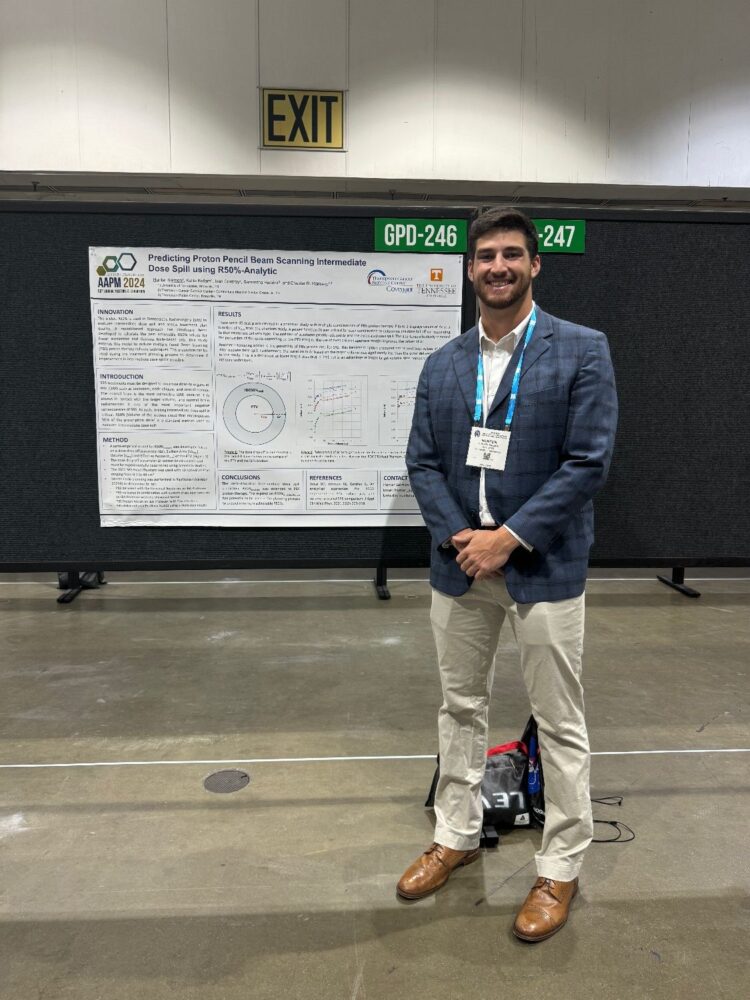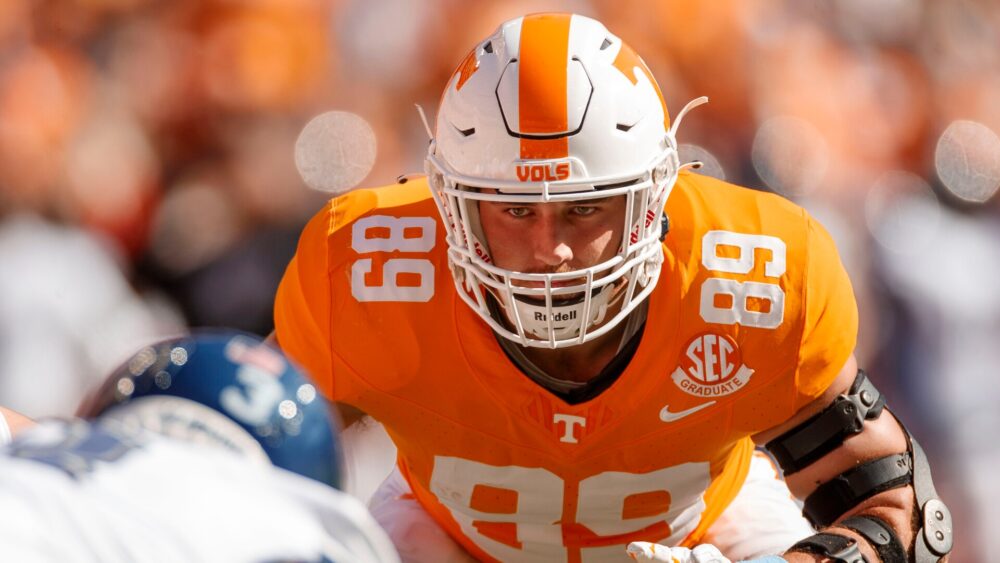Hunter Salmon (BS/NE, ’23) didn’t want to take any chances with his health. As a young athlete, he noticed his heart rate was slow. His family took him to the doctor to get it checked out and Salmon learned it was common among athletes.
The visit, however, left a lasting impression on Salmon by raising his awareness about the medical field. It guided his decision to major in nuclear engineering at the University of Tennessee while minoring in physics.
Salmon graduated with honors and is currently in his second year of a pursuing a master’s degree in medical physics. He is a teaching aide in a radiation biology class for NE Assistant Professor Ivis Chaple Gore, a radiochemist with experience in isotope production and radiochemistry for nuclear medicine and molecular imaging applications.
“My parents raised me very well and prioritized trying to take care of others before yourself, so medical physics kind of wrapped all of that into one,” Salmon said. “I get to help others in the medical realm, and I still get to enjoy the math and science of things, because that is where I excelled when I was younger.”

Salmon’s success in the classroom is even more impressive given he spent five years as a walk-on tight end on the UT football team. He juggled long days of work on the field with long nights of studying in a rigorous major.
“It was a lot of time management, and I also had a lot of help along the way,” Salmon said. “The Thornton Center for athletics got us tutors and helped us transition from the high school schedule into the college schedule, which is different when you first get into it. But the football timeline is very tough because it’s 40–50 hours per week. And then on top of that, you’re tired from running around and hitting people.”
Chris Johnson, associate athletics director and assistant provost for the Thornton Center, called Salmon “one of the most impressive student-athletes that I have had the opportunity to work with in my 15-year career in collegiate athletics.”
“His ability to be a multi-year contributor on the football field at a program like the University of Tennessee, while also becoming an SEC academic honor roll student as a nuclear engineering student is truly elite,” Johnson said. “Hunter embodies everything that is good about collegiate athletics and the student-athlete experience. It was a pleasure to have the opportunity to support him during his journey.
Learning Through Major Transitions
Growing up in Alabama, Salmon knew he wanted to play football in college. It was just a matter of where he could find the best mix of athletics and academics. During high school, he Googled the top engineering programs in the country and a list of schools where he wanted to play.
“There are only a few that really aligned with both, and Tennessee was one of those,” Salmon said. “Nuclear kind of fit into that medical physics realm, where I could still use my math and science brain and apply it to a medical field, because a lot of the nuclear physics and particle physics kind of align with how the treatment machinery works.”
Salmon’s high school coaches knew some of the former UT football coaches and Salmon attended a camp at UT. He was offered a spot as a preferred walk-on, meaning he didn’t receive an athletic scholarship.
Salmon had four different position coaches during his time on the football team and saw a lot of friends transfer or get cut.

“Dealing with transition is hard, and being able to still be yourself around a multitude of different people was something I learned,” Salmon said. “I was also able to fine tune qualities that companies and other employers look for, like discipline, time management, communication, and punctuality.”
Convincing Salmon’s dad to cheer for the Vols once Salmon joined the team required patience. Mark Salmon was an Alabama graduate, and didn’t allow the color orange in the house while Hunter was growing up because of rivalries with UT, Auburn, and the local high school rival, Hoover.
“When I first got here, he started wearing just the white, the black, and maybe a UT logo, but nothing crazy,” Salmon said. “Through the years, I would give him some of the stuff that I got for Christmas. I would give him a UT shirt for his birthday, give him some UT shorts. Now, he’s got a UT Apple watch band, and he’s transitioned a little.”
Mastering Medical Physics
Salmon is working on a master’s project that centers around proton therapy and radiation dose spill in the brain.
“During treatment, you have an area that you’re trying to treat, aka the tumor, and the intermediate dose spill is how much of that radiation dose spills outside of that tumor volume,” he said. “It’s about trying to limit that volume that is irradiated and trying to figure out which treatment modality does that the most efficiently.”
Salmon is on schedule to graduate with his master’s in May of 2025. He plans to become a medical physicist and will serve a two-year residency to gain clinical training and experience. A medical physicist is a health professional who applies physics to medicine to develop and use medical technologies, devices, and radiation treatments.
Salmon’s academic and athletic experience at UT positioned him to pursue all the goals he set as a child.
“There’s a lot of great professors here and a lot of them do research. I think that’s one of the things at UT that’s ideal, is they allow you to have opportunity,” Salmon said. “Yes, they’re great professors, but they also have other things going on, and they’re doing their own stuff for the industry that I don’t think a lot of other places really have. I just feel lucky and blessed to be a part of it.”
Contact
Rhiannon Potkey (865-974-0683, rpotkey@utk.edu)